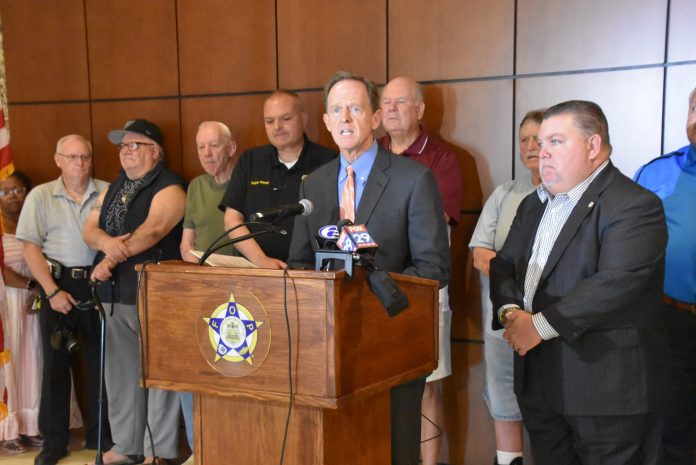U.S. Sen. Pat Toomey was in the Far Northeast, Monday, May 20, to rally support for legislation to make it easier to give the death penalty to those convicted of killing or attempting to kill a police officer.
Speaking in the lobby at the Fraternal Order of Police Lodge 5, Toomey said his Thin Blue Line Act would require juries to consider the victim’s status as a police officer as an “aggravating factor” when deciding whether to impose the death penalty.
“I’ve introduced the Thin Blue Line Act to send a simple message: If you murder or target a police officer for murder, you should expect the harsest possible penalty,” Toomey said.
Toomey said some elected officials have put “scoring political points” ahead of securing justice for the families of murdered police officers. He spoke about Sgt. Robert Wilson, a Philadelphia Police officer who was fatally shot in 2015 inside a North Philadelphia video game store.
“The Philadelphia DA went against the wishes of Sgt. Wilson’s family and made a plea deal with his killers,” Toomey said. “I believe that our police officers deserve better than that.”
Brothers Carlton Hipps and Ramone Williams pleaded guilty to killing Wilson last summer and received life sentences without the possibility of parole.
Ben Waxman, a spokesman for the District Attorney’s Office, defended the decision to offer a plea deal.
“They will die in prison, period,” he said in an email. “And they agreed to give up their appellate rights, so no appeals, no more court dates, nothing. It’s over and done.”
Waxman also pointed out that Gov. Tom Wolf has declared a moratorium on the death penalty. The last person executed in Pennsylvania was murderer and rapist Gary Heidnik in 1999.
“So Toomey can beat his chest all he wants, but the outcome would have been the same — except for a lot more constitutionally-mandated appeals for the defendants,” Waxman said.
The Thin Blue Line Act has been attacked as being redundant, since every state has laws providing for stricter sentences for those convicted of killing a police officer. It is opposed by the Americal Civil Liberties Union and the NAACP’s Legal Defense Fund, among others.
Toomey said the law is necessary. Under current federal law, juries can only consider the victim’s occupation if they are a federal law enforcement officer, he said. His proposal would extend the protection to local officers, firefighters and prosecutors.
“This legislation is not about making a case that the life of any one category of Americans is more important than that of any other category,” Toomey said. “It’s about the criminal that would actually single out and kill a law enforcement officer. That is the most dangerous type of person in our society.”
FOP Lodge 5 President John McNesby and Mike Purcell, of the Federal Law Enforcement Officers Association, also spoke at the news conference in favor of Toomey’s legislation.
“This should, you would think, be absolutely a no-brainer in the Capitol,” McNesby said.
In addition to the FOP and FLEOA, the Thin Blue Line Act is backed by the AFGE Council of Prison Locals, National Association of Police Organizations and Sgts. Benevolent Association of New York City.
Toomey introduced the bill in 2017, and it was passed by the U.S. House of Representatives. He recently reintroduced it in the Senate, and it was referred to the Judiciary Committee.
“It’s my intention to drive this to a vote,” he said. ••
Jack Tomczuk can be reached at [email protected]






